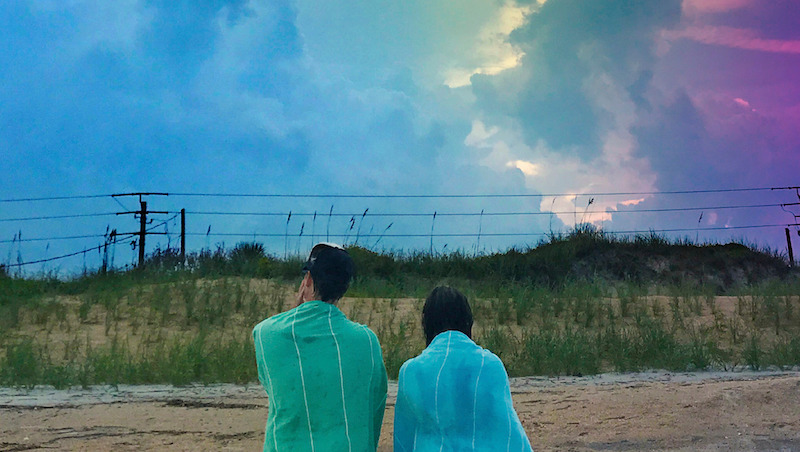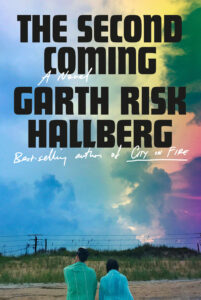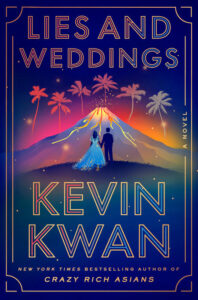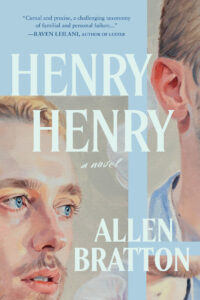
Our mixum-gatherum of marvelous reviews this week includes Thomas Mallon on Garth Risk Hallberg’s The Second Coming, Alexandra Jacobs on R.O. Kwon’s Exhibit, Nat Segnit on Hari Kunzru’s Blue Ruin, Louis Bayard on Kevin Kwan’s Lies and Weddings, and Hugh Ryan on Allen Bratton’s Henry Henry.

“The Great American Novel is a long-dead cultural aspiration, extinguished by a healthy realization that the country is too big and too varied to generate any singular, definitive volume. American novelists tend, in our time, to earn public recognition of greatness in a steady, incremental (one is almost tempted to say un-American) way: through the long-term production of many books that arrive with a certain regularity and are roughly on the same scale, one to the next. For writers as different as Alice McDermott, Colson Whitehead, and Richard Powers, the greatness classification comes more from accrual than from explosion. Even so, some younger novelists with exceptional gifts seem to have a romantically persistent notion of the single-book catapult. Now in his mid-forties, but still boyishly author-photo’d, Garth Risk Hallberg continues to wobble with promise and perplexity. His novels, so far only three in number, sometimes murmur and sometimes roar, operating by wisps of inference or by maximalist elaboration. He has flirted with a kind of cosmic connectedness, or at least a large sociopolitical canvas, before subsiding—as he has done with his new book, The Second Coming—back into the super-circumscribed and familial. Looking at the three books together, a reader perceives not so much a multifarious œuvre as a series of make-or-break shots … Can there be, for a novelist this exuberantly inventive, a sweet spot between the oblique, inferential Field Guide and the gigantic particle accelerator that was City on Fire? Maybe not, since the nature of this writer’s gifts seems irreconcilable with the very idea of middle ground. But that’s what he appears to be seeking in The Second Coming, only to wind up running too far away from the scope of his previous novel … There is still more to fiction than feelings. One wants Hallberg to overreach, but by zooming out once more instead of zooming in. If the great national novel is an absurdity, perhaps the great municipal one remains possible. Hallberg may be the writer who produces a truly encompassing book of fiction set in the time of 9/11 or of covid, neither of which has yet been written. Either of them is more likely to end in failure than in complete success, but he is sufficiently supplied with talent to make the attempt, and, even after this latest novel, one does remember that risk is his middle name.”
–Thomas Mallon on Garth Risk Hallberg’s The Second Coming (The New Yorker)
“‘Everything was beautiful at the ballet,’ goes the famous song from A Chorus Line, but of course backstage there are blisters, anorexia and worse, like the feathers popping out of Natalie Portman’s back in Black Swan. Hypnotic and sometimes perplexing, R.O. Kwon’s second novel, Exhibit, literalizes the twinning of pain and art with a ballerina character who is an actual sadomasochist … ’Tis the season for outré novels of marital malcontent among the creative class. But all three in this triangle have had to compromise in order to get along in mainstream America … Kwon stretches and pauses the language to its outer limits, as if in a series of tendus and arabesques … as much as commas, Kwon favors semicolons, which Kurt Vonnegut infamously called ‘transvestite hermaphrodites representing absolutely nothing’; if so, her novel is not just an exploration of BDSM in contemporary relationships, but a transvestite hermaphrodite convention, to which one is both privileged and perhaps slightly puzzled to receive an all-access pass. Exhibit is a highly sensory experience, awash in petals and colors, smells and flavors, that adds to the literature on a proclivity much discussed and often misunderstood. It lingers like a mysterious, multihued bruise.”
–Alexandra Jacobs on R.O. Kwon’s Exhibit (The New York Times)
“[A] peculiarly dread-soaked, intellectually engaged, state-of-the-nation take on the country house novel … The result is like a stab at portraiture by a talented landscape painter: a novel that is considerably less convincing in figure than in ground … All credit to Kunzru here: it is no mean feat, evoking that short but exceptionally well-documented period in British cultural history, to thread the needle between verisimilitude and poking fun at a subculture so naturally self-satirizing that it had exhausted itself of comic potential almost at the moment it emerged. Kunzru succeeds largely by virtue of restraint … Which brings us back to the house in the woods. By comparison to the flashback material the scenes that take place in the novel’s present are oddly overdetermined … It is in the implications of Jay’s Gatsby-esque self-erasure – more than in the somewhat soapy consequences of his reappearance – that Blue Ruin really comes into its own as a penetrating, hyperarticulate meditation on art as either an accessory to toxic consumerism or a means of rendering ourselves invisible to it.”
–Nat Segnit on Hari Kunzru’s Blue Ruin (Times Literary Supplement)

“In the opening pages of Kevin Kwan’s new novel, Lies and Weddings, a man is impaled on a crystal chandelier. Even in the act of reading that, I was wondering how it could happen. Somebody, I figured, could be crushed by a chandelier or else impaled by a chandelier, if it landed just so, but impaled on a chandelier? Where would the pointy bits even go? I spent some time trying to picture it—I even Googled to see if it had happened to anybody ever—but, of course, I was missing the point. In Kwan’s universe, things happen for the plain and happy reason that he wants them to. Pose an objection, he’s already galloping on, and if you want to go along for the ride—as millions of readers have—you have to suspend your private laws of probability, and once you do, it will all be over quickly and sunnily … One might expect all this taxonomy to bring Kwan’s characters to more dimensional life, but if anything, it pins them more fiercely to the page, prisoners of their coordinates (as used to happen to Tom Wolfe’s characters). The rich may be different from you and me, but, in Lies and Weddings, they’re awfully alike … Are we to revel in or recoil from their unheeding hedonism? Behind every great fortune, it has been said, there is a crime, and Kwan makes a point of noting what wealth can wreak—poverty, racism, exploitation, environmental degradation—but he’s too canny a showman to let any of these critiques linger. In the world of rom-com fantasy, being wealthy has always been a hell of a lot more fun than being poor. If some guy’s going to be impaled on a chandelier, please God, let it be crystal.”
–Louis Bayard on Kevin Kwan’s Lies and Weddings (The Washington Post)

“With this reimagining, Bratton has created a marvelously detailed world of supernumerary aristocrats, as rich, toxic and wild as the best entries in the Real Housewives franchise … In Hal, Bratton offers a psychologically acute portrait of the kind of trauma-born narcissists who yo-yo between judging everyone else as beneath them and hating themselves for those very judgments. But a portrait is not a novel, which depends as much on plot and action as it does character and world-building. Bratton has accurately drawn a protagonist stuck still by his pain, and the result is a story that for long stretches also feels stuck itself … One of Shakespeare’s great skills was creating unreliable characters who profess to be in control of their madness or depravity while simultaneously seeming to be lost in its grips. That ambiguity allowed every member of the audience (or future adapter of his stories) to make their own call on these knotty figures. Bratton positions his protagonist to be one of these Shakespearean enigmas, but by giving Hal a direct and backward-looking explanation for his actions—Hal’s bad because Hal’s traumatized —Henry Henry obviates the delicious questions about his behavior. Sure, Hal’s self-aware about his conduct, but he doesn’t seem to have agency over it, and thus lacks that Shakespearean moral complexity. And without that, Henry Henry feels well written but inert.”
–Hugh Ryan on Allen Bratton’s Henry Henry (The New York Times Book Review)
If you buy books linked on our site, Lit Hub may earn a commission from Bookshop.org, whose fees support independent bookstores.

